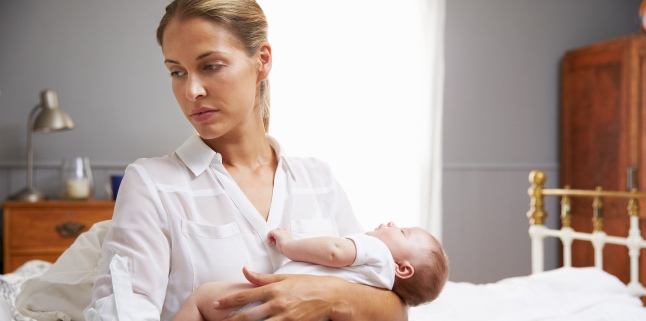The difference between depression and postpartum psychosis

Symptoms of postnatal depression are similar to depression that occurs from other causes. These include a bad mood and other symptoms lasting at least two weeks. Postpartum psychosis is different from postnatal depression and is a more severe condition. This can be manifested in several different ways when it starts. Women often have symptoms of depression or anger or a combination of both. Symptoms can change very quickly, from one hour to another and from one day to the next.
Symptoms of postpartum psychosis There are numerous symptoms of postpartum psychosis. These may include: - Anxiety or - A mood disorder - Easy strokes - Sudden mood swings - Severe confusion - Feeling and agitation - Different behavior than normal - Difficulty sleeping or lacking . Symptoms of postpartum depression - irritability - feeling tired - appetite changes - lack of sensation - negative thoughts and feelings of guilt - anxiety - feeling of futility - desire to avoid contact with other people. When symptoms manifest? As for postnatal depression, the onset of symptoms varies. This condition can begin in the first or second month after childbirth, but it may also begin some months after pregnancy.
About a third of women with postpartum depression have symptoms that started in and continue after birth. In postpartum psychosis, most of these episodes begin in the first two weeks after birth. Symptoms often begin in the first few days after pregnancy. In rare cases, the disorder may start later, a few weeks after the baby was born. Several possible causes have been suggested for postnatal depression.
There is no single cause underlying this condition, with probably many different factors that lead to postpartum depression. It is possible for a woman to experience postnatal depression if she previously had mental health problems including depression, anxiety or depression during pregnancy, if she had no support from family and friends, or if she recently had an event . There may be a physical cause of postpartum depression, such as a subactive thyroid. This problem can be treated easily. Other incriminated causes are poor diet, hormonal changes or lack of sleep.
At the same time, postnatal depression can start without an obvious cause. Postpartum psychosis is not caused by anything what a woman or her partner might think or do before pregnancy. Therefore, problems in a relationship, stress or unwanted pregnancy do not cause psychosis. There are probably many factors that lead to an episode of postpartum psychosis. They are known to have an important role.
Women with a close relative who had such an episode are at increased risk for postpartum psychosis. and sleep disorders can also be involved. But more research is needed. Women who have had episodes of serious psychiatric disorders in the past, especially at high risk of postpartum psychosis. Also, women who have had a severe psychosis episode following a previous pregnancy also have a very high risk.
For many women with postpartum psychosis, there may be no warning, in contrast to others it is clear that they are at increased risk. If a woman has ever had a diagnosis of bipolar or schizoaffective disorder, then her risk of postpartum psychosis is high. In the case of postpartum depression, most women recover without treatment within 3-6 months. One in four women with postnatal depression still has a depressed condition when the child has one year. Treatment may include therapy and medication.
Recovery after postpartum psychosis may take up to 6-12 months. The most severe symptoms tend to last between 2 and 12 weeks. The vast majority of women are completely recovering. There is also the possibility of returning an episode. It is important that people who have an increased risk of having postpartum psychosis talk to their family doctor or a doctor to determine what can be done to prevent a possible episode.
.
Source : sfatulmedicului.ro
Views : 3117
Popular Article
- (photo) Nude becomes art.
Posted: 2018-03-17, 9651 views.
- The harmful effects of air conditioning on the skin
Posted: 2017-06-08, 8344 views.
- 3 causes of dyed hair discoloration
Posted: 2017-06-15, 8218 views.
- Why early puberty occurs in girls: symptoms, favors, diagnosis and treatment
Posted: 2017-10-24, 8070 views.
- Good or bad skin treatments in the hot season
Posted: 2017-06-07, 7802 views.
Recommendations
- (photo) Nude becomes art.
Posted: 2018-03-17, 9651 views.
- The harmful effects of air conditioning on the skin
Posted: 2017-06-08, 8344 views.
- 3 causes of dyed hair discoloration
Posted: 2017-06-15, 8218 views.
- Good or bad skin treatments in the hot season
Posted: 2017-06-07, 7802 views.
- Risks of practicing sports on hot days
Posted: 2017-06-12, 7400 views.
 4 effective ingredients in the fight against acne.
4 effective ingredients in the fight against acne. How to get rid of hiccups fast
How to get rid of hiccups fast The wheat bran diet: the secret of lost pounds as if by magic
The wheat bran diet: the secret of lost pounds as if by magic The recipe that will sweeten your soul this weekend!
The recipe that will sweeten your soul this weekend!  Is it dangerous or not to refreeze meat after thawing it?
Is it dangerous or not to refreeze meat after thawing it?  The unusual sign of diabetes indicated by saliva.
The unusual sign of diabetes indicated by saliva. What to drink to boost your immune system.
What to drink to boost your immune system. 10 foods that help you never age.
10 foods that help you never age. What actually happens in your body if you drink a cup of coffee for breakfast
What actually happens in your body if you drink a cup of coffee for breakfast 5 surprising benefits of chia seeds
5 surprising benefits of chia seeds